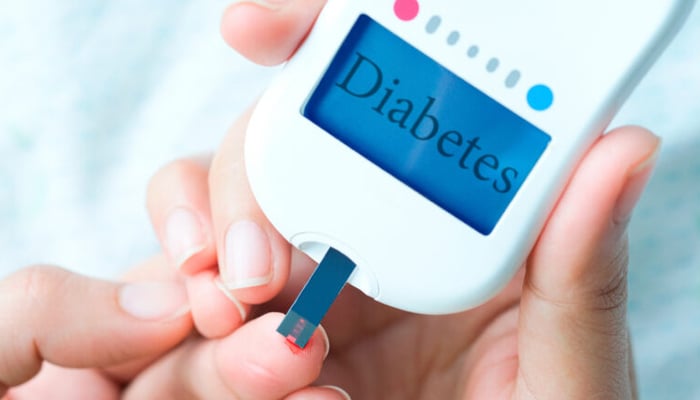Network of 3,000 diabetes clinics launched to offer free consultations
A network of 3,000 diabetes clinics, aimed at providing free consultations to around 75,000 patients daily, has been launched across Pakistan. This initiative, called the National Diabetes Network (NDN), will particularly benefit the remote areas where access to standardised medical care is limited. The announcement was made by experts and officials on Saturday.
“Today we have officially launched the [NDN] under the Health Promotion Foundation [HPF], in collaboration with Meri Sehat, Pakistan’s first AI-enabled healthcare platform, and Getz Pharma,” said HPF Vice Chairman Prof Abdul Basit during the launch at NADEP Footcon 2024. “This network will bring standardised diabetes care to millions across the country.”
Prof Basit noted that the experience gained from operating NDN clinics in Karachi has laid the groundwork for expanding to 3,000 locations nationwide. Each clinic will offer free consultations to 25 diabetes patients daily, he said.
“We aim to provide free consultations to 75,000 people daily across Pakistan. These patients will also receive medications at a 50 per cent discount and lab tests at a 25 per cent discount, thanks to a partnership with Chughtai Lab,” he explained.
He emphasised that the NDN is set to become the world’s largest free health network initiated by the private sector. He acknowledged the critical support provided by Getz Pharma in terms of financial and technical assistance.
“Thousands of people in Pakistan suffer from foot ulcers and amputations due to uncontrolled diabetes, as they can’t afford the necessary treatment,” said Prof Basit.
“Every day approximately 35 to 40 people in Pakistan lose their lower limbs due to diabetes complications. Without appropriate interventions, up to 600,000 individuals can face amputations by the end of this year,” he warned, calling for broader societal support.
Getz Pharma Managing Director Khalid Mahmood expressed concern over Pakistan’s health and social development indicators, noting that they lag behind even some Sub-Saharan African nations. “Despite being a nuclear power, Pakistan faces challenges in areas such as vaccination coverage, nutrition, and maternal and child health.”
He pointed out that after China and India, Pakistan has the third-highest diabetes prevalence globally. The healthcare system is under-resourced, especially in the rural areas, where access to trained endocrinologists, diabetes educators and necessary medical equipment is scarce, he said.
He added that Getz Pharma is committed to making diabetes care in the country more affordable by providing essential medicines and insulin at subsidised rates.
Meri Sehat CEO Babar Rashid expressed concern over the increasing number of young individuals dying prematurely due to diabetes complications. “No parent should have to bury their child because of a preventable disease.”
To address this, Meri Sehat has developed innovative diabetes patient management software that allows doctors to remotely manage multiple clinics, reducing costs and ensuring the sustainability of the network. This software also integrates patient data into the Diabetes Registry of Pakistan, centralising information for better decision-making and research.
To further improve care quality, Meri Sehat has created a Learning Management System and certification programme for diabetes educators and doctors. This initiative ensures healthcare professionals across the network are equipped with up-to-date knowledge and skills to provide high-quality care.
-
 Jessie Buckley Reveals Why BAFTA Win Felt Extra 'special' With Cillian Murphy
Jessie Buckley Reveals Why BAFTA Win Felt Extra 'special' With Cillian Murphy -
 Halle Berry Reveals Bedroom Performances That Are Off-limits In Her Engagement To Van Hunt
Halle Berry Reveals Bedroom Performances That Are Off-limits In Her Engagement To Van Hunt -
 Why Nicole Kidman 'not Rushing' Into Love After Split From Keith Urban?
Why Nicole Kidman 'not Rushing' Into Love After Split From Keith Urban? -
 Benny Blanco's Dirty Feet In Debut Podcast Divide The Internet
Benny Blanco's Dirty Feet In Debut Podcast Divide The Internet -
 Jeffrey Epstein Blamed King Charles As Andrew Left Trade Enjoy Job
Jeffrey Epstein Blamed King Charles As Andrew Left Trade Enjoy Job -
 King Charles Asked To Lean On Princess Anne To Avoid ‘media Circus’
King Charles Asked To Lean On Princess Anne To Avoid ‘media Circus’ -
 Passenger Wins £10,000 Payout From Heathrow Airport After 100 Ml Liquids Dispute
Passenger Wins £10,000 Payout From Heathrow Airport After 100 Ml Liquids Dispute -
 Eric Dane's Costar Under Fire For Hurling Accusations At Him After His Death
Eric Dane's Costar Under Fire For Hurling Accusations At Him After His Death -
 Paul Anthony Kelly Breaks Silence Over Online Discussion About His Chest Hair: 'I Own It'
Paul Anthony Kelly Breaks Silence Over Online Discussion About His Chest Hair: 'I Own It' -
 Queen Camilla Greets The Paddington Bear At BBC’s 500 Words Grand Final
Queen Camilla Greets The Paddington Bear At BBC’s 500 Words Grand Final -
 Chinese Astronauts Finally Reveal Why Spacecraft Left Them ‘stranded’ For 437 Days In Space
Chinese Astronauts Finally Reveal Why Spacecraft Left Them ‘stranded’ For 437 Days In Space -
 Khloe Kardashian Reacts To AI Videos With Dad Robert Kardashian Kissing Her: 'That Freaks Me Out'
Khloe Kardashian Reacts To AI Videos With Dad Robert Kardashian Kissing Her: 'That Freaks Me Out' -
 Sinitta Makes Shock Admission About Marriage To Andy Willner Post Simon Cowell Heartbreak
Sinitta Makes Shock Admission About Marriage To Andy Willner Post Simon Cowell Heartbreak -
 Bill Gates Calls Ties To Jeffrey Epstein 'huge Mistake,' Reveals Past 'affairs'
Bill Gates Calls Ties To Jeffrey Epstein 'huge Mistake,' Reveals Past 'affairs' -
 Switzerland Announces One-time Compensation For Swiss Bar Fire Victims
Switzerland Announces One-time Compensation For Swiss Bar Fire Victims -
 Ryan Coogler Shares Thoughts About Building Community Of Actors Amid 'Sinners' Success
Ryan Coogler Shares Thoughts About Building Community Of Actors Amid 'Sinners' Success




